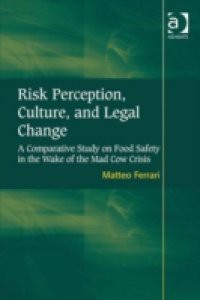This study explores the reasons behind the different responses of the legal systems of Europe, Japan and the USA in coping with BSE, one of the major food safety crises in recent years. Making reference to the most recent advances on risk perception that cognitive and social sciences, such as legal anthropology and sociology of law, have experimented with, Risk Perception, Culture, and Legal Change examines the role that culture plays in moulding the process of legal change. Attention is focused on the regulative frameworks implemented to guarantee the safety of the food chain against the BSE menace and on the liability responses sketched to compensate the victims of mad cow disease, showing how both these elements have been influenced by the cultural context within which they are situated.

